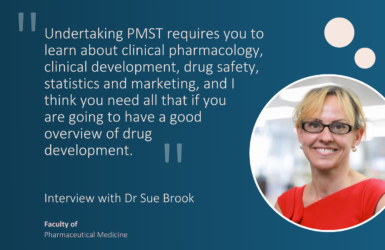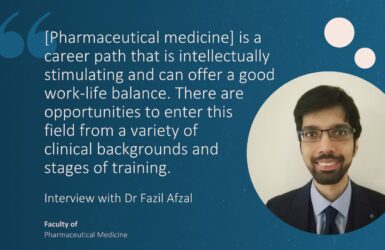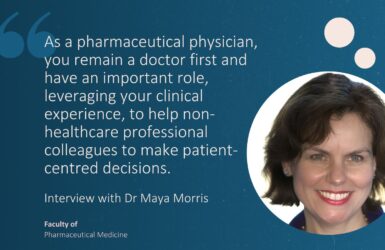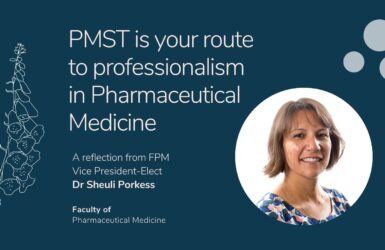Interview with Dr Tope Adeloye
Posted on: Monday 19 December 2022
Author: Konrad Obiora
In the final interview of the series celebrating pharmaceutical medicine’s 20th year as a recognised UK medical specialty, Dr Tope Adeloye talked to me about her decision to join pharmaceutical medicine and career in the specialty.
The views and opinions expressed in this article are those of the people involved and do not represent the views of the any company, nor, necessarily, represent those of FPM.
Dr Tope Adeloye has worked in pharmaceutical medicine for over seven years, starting with her first role as a screening/research physician for Hammersmith Medicines Research. Tope completed the Pharmaceutical Medicine Specialty Training (PMST) programme in 2020 gaining entry on to the GMC’s specialist register the same year.

KO: Why did you leave clinical practice to join pharmaceutical medicine?
TA: It started out as a process of elimination, ruling out specialties that I knew weren’t right for me and then finding pharmaceutical medicine, learning more about the specialty and deciding that I wanted to join the specialty.
I was quite undecided when I was at medical school about which medical specialty I wanted to specialise in. I was still unsure when I became a junior doctor, but I felt that if I rotated round different specialties during the foundation programme and core medical training, I would get a better feel for the specialty that would work for me. At the end of my core medical training year, I visited the JRCPTB [Joint Royal Colleges of Physicians Training Board] website to look at all the available medical specialties that had training programmes and I came across pharmaceutical medicine.
I had never heard of pharmaceutical medicine – it was not a well-known specialty when I was at medical school or when I was a junior doctor. The specialty caught my eye because of my interest in clinical pharmacology. I contacted FPM to find out how to enrol on to the Pharmaceutical Medicine Specialty Training (PMST) programme.
What did you do to prepare for your first role in pharmaceutical medicine?
I did background reading. I bought the Oxford specialist handbook in pharmaceutical medicine and completed online GCP [good clinical practice] training because I saw that GCP was an important part of the specialty. I made notes from my reading of the handbook and GCP training, and I familiarised myself with the regulatory framework, acronyms and terminology used in pharmaceutical medicine. I found my induction at HMR [Hammersmith Medicines Research] very helpful because I worked alongside and shadowed a screening physician, which enabled me to apply what I had learnt and to get hands on experience.
Did you encounter any challenges when you joined the specialty that you did not anticipate?
I had to get used to the systems, processes and paperwork. It was very different from working in the NHS, which was about going on ward rounds, taking patient histories and examining patients.
Did your clinical experience help in your role as a screening physician?
Yes, the experience did help in terms of applying the basic clinical skills of taking a history, carrying out physical examinations and knowing which questions to ask if symptoms are reported. I think the one thing that I encountered working as screening physician that I did not experience working as a clinician was the wide spectrum of normal variants in healthy volunteers. When working in the NHS, a clinician will be used to managing patients who are unwell, but in the HMR’s phase 1 unit, I am mainly managing healthy volunteers with normal variants particularly in things like ECGs, which I had not encountered in the NHS and which I had to learn about.
Why did you decide to undertake PMST?
After I joined pharmaceutical medicine, I wanted to do training equivalent to what I would have done if I was still working in the NHS. I knew that it was not essential to complete PMST, but it was a personal choice and I wanted to make sure I was properly qualified, fully informed and knowledgeable to do my job. My background reading was a good starting point to do more in depth study of the PMST curriculum and for the DPM [Diploma in Pharmaceutical Medicine] exam.
What advice would you give a doctor who is thinking about a career in pharmaceutical medicine?
My advice would be to find out about the specialty and whether it is right for you. If you can get work experience or shadow a pharmaceutical physician, which I didn’t have, that would be helpful. Talk to pharmaceutical medicine trainees, attend educational events organised by the Faulty, read the information on the FPM website and pick up the suggested reading.
Can you talk about your work as a senior research physician, principal investigator and head of pharmacovigilance?
As a senior research physician and PI [principal investigator], I am responsible for overseeing clinical trials for sponsors, so I act as the team leader and the team includes several departments such as ward staff, nurses, pharmacy, data management. I sometimes work with a trial physician who is normally responsible for the day-to-day running of clinical trials and I am available to provide support to them if needed. In my role as head of PV [pharmacovigilance], which was a responsibility that I took on recently, I set up HMR’s PV service and we provide PV support for clinical trials particular to those that are not run at the HMR site.
Pharmaceutical medicine has been a recognised medical specialty in the UK for 20 years. Where do you see pharmaceutical medicine in another 20 years’ time?
I am optimistic that pharmaceutical medicine will continue to go from strength to strength as a specialty. The pandemic and the development of new COVID vaccines put a spotlight on pharmaceutical medicine as a specialty that it didn’t have before. There’s real scope for pharmaceutical medicine to gain more recognition and become a mainstream specialty.
Did you start any new hobbies during the various COVID-19 lockdowns?
I started learning to play the keyboard during lockdown – I’m still very much a beginner. I found resources on YouTube and during lockdown I found the time and space to learn a new instrument. I can play ‘Twinkle, Twinkle, Little Star’ – it’s basic, but it has some chords and not just the melody.




